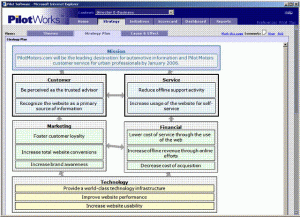After many years as a performance management enthusiast, I sometimes forget how much confusion there still is around the topic. Since I’m a big believer that standardized language helps reduce confusion, I’ve decided to summarize some of my deeply held beliefs on performance management: An objective describes what you want to accomplish. For example, ‘win…
Archive | balanced scorecard
Software Consumption
Words matter. Using the the phrase software consumption rather than building, marketing, and selling software can allow you to re-imagine your business. Here’s one such story: I’m a fan of the logic model because it emphasizes outcome KPIs that monitor impact rather than output metrics that track activities. I also like strategy maps because they are simple…

Strategy shouldn’t be static
My previous company used the slogan ‘aligning execution with strategy’ to emphasize that often what companies do (their execution) often doesn’t match what they say they want to do (their strategy). The phrase became so common among employees, partners, and customers that we would sometimes slip up and say ‘aligning strategy with execution.’ When that happened, I would often…
What’s Missing from your Scorecard?
In a short, but insightful, piece called ‘What’s Missing from Your Scorecard?’ Mark Graham Brown suggests eight categories of metrics which should be better represented on a balanced scorecard: Mark’s issue with employee satisfaction is most companies measure it annually which provides little opportunity to take action on the findings. While I agree, I also worry about…
Prioritizing What’s Important
Long-time readers know I recommend creating an alignment-focused organization as the fundamental way to improve performance. As I’ve said in many publications (BPM Magazine, Information Management, CxO magazine), To do so, organizations must motivate their employees with integrated and cascaded objectives, manage priorities based on impacts rather than perceived urgency, monitor progress towards outcomes, and…
Can You Say What Your Strategy Is?
In the Harvard Business Review article Can You Say What Your Strategy Is?, David Collis and Michael Rukstad claim most executives cannot summarize their company’s strategy. Of course, if executives can’t, no one else in the organization will be able to. And those organizations that don’t understand their strategy are unlikely to execute them successfully. In their words:…

Web channel performance management
For many years, I’ve argued that performance management is not just limited to finance but instead has many flavors, including workforce, operational, and IT performance management. Most people now seem to agree and there’s even talk of pervasive performance management. However, a critical analysis of the current situation suggests that marketing organizations are still early on…

Treating citizens as customers
Last month Ingrid Koehler (re)started an interesting discussion on whether citizens should be considered customers. While the debate isn’t necessarily new, it might be back in vogue with a majority of U.S. voters clamoring for change but the nation in a difficult financial situation. In a comment, Kari Manovitch suggests one size doesn’t fit all and that community, customer or…

Focused Organizations
As Balanced Scorecard practitioners know, Kaplan and Norton recommend five principles for strategy focused organizations: translate the strategy to operational terms; align the organization to the strategy; make strategy everyone’s everyday job; make strategy a continual process; and mobilize leadership for change. The City of Charlotte, NC applied these principles to become a Balanced Scorecard…
Analysts on Strategy Management
Readers of this blog will know I have a deep affinity for a portion of Performance Management that has come to be known as Strategy Management. The most obvious explanation for my passion is the fact I ran a company often cited as pushing the envelope in strategy management. However, I’ve also always felt the…